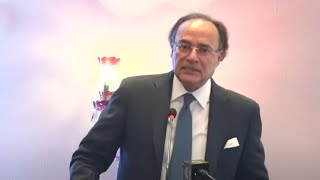PM Shehbaz approves 10-year roadmap for Pakistan’s power sector
- Plan expected to save $17 billion through rescheduling, cancellation of 7,967MW of planned projects
ISLAMABAD: Prime Minister Shehbaz Sharif has directed the Power Division to continue efforts aimed at reducing electricity prices, eliminating circular debt and controlling line losses and theft, sources told Business Recorder.
These directives were issued as the Prime Minister approved the Integrated Generation Capacity Expansion Plan (IGCEP) 2024–34, a long-awaited 10-year roadmap for Pakistan’s power sector. The plan is expected to save $17 billion through rescheduling and cancellation of 7,967 MW of planned projects.
The core objective of the IGCEP is to ensure the availability of affordable and reliable electricity. All new projects included in the plan have been selected based on the minimum-cost principle.
PM approves 10-year IGCEP 2025–35
According to official estimates, the revised strategy is expected to reduce the national economic burden by Rs 474.3 billion and yield savings of approximately $10 billion (Rs 2,790 billion) by adjusting project timelines. An additional $7 billion (Rs 1,953 billion) in savings is projected by scrapping 7,967 MW of proposed projects.
These changes are also expected to bring down electricity tariffs, with estimated average savings of more than Rs 2 per unit. Officials assert that — for the first time — electricity projects have been chosen purely on merit and in full transparency. Costly and unnecessary projects have been removed, with national interest prioritized over individual or political gain.
“The Power Division, through structural reforms, shall make continuous efforts to reduce the price of electricity, eliminate circular debt, control line losses and theft, and eradicate corruption in Discos,” the Prime Minister was quoted as saying.
“Renewable energy must be promoted to protect the climate and save foreign exchange currently spent on imported fossil fuels,” he added.
Under the original IGCEP, 14,984 MW of new projects were planned. This has now been trimmed to 18 projects totaling 7,017 MW, including strategic hydropower projects such as Dasu and Mohmand Dams. Priority has been given to 7,987 MW of projects based on indigenous resources —hydropower, solar, nuclear, and wind — to reduce dependency on imported fuels like coal and natural gas, thereby saving billions in foreign exchange annually.
The Ministry of Water Resources has been tasked with ensuring timely completion of strategic hydropower projects according to the Prime Minister’s approved timelines. The Ministry must also ensure financial close of these projects and prevent any cost overruns. The Chairman of WAPDA has been directed to submit regular progress reports to the Prime Minister.
Additionally, the Secretary Power, Secretary Petroleum, and Chairman of the Task Force have been instructed to resolve inter-ministerial and cross-cutting issues to ensure smooth operations and timely implementation.
A high-level committee has also been constituted to oversee reforms in the petroleum sector. This committee will develop strategies to synchronize LNG demand with the power sector’s requirements, address cargo diversion issues, and tackle circular debt and tariff challenges in the gas sector.
The committee comprises: (i) Minister for Petroleum (Convener); (ii) Advisor to Prime Minister on Privatisation (Co-Convener); (iii) Lt. Gen. Muhammad Zafar Iqbal (Member); (iv) Secretary, Power Division (Member); and (v) Secretary, Petroleum Division (Member)
The committee’s Terms of Reference (ToRs) include: (i) developing a proposal to align LNG demand of the power sector with supply availability to prevent abrupt demand fluctuations; (ii) identifying causes and solutions for sudden changes in LNG demand that lead to diversion of cargoes; (iii) recommending measures to reduce circular debt in the gas sector; (iv) proposing a rationalized LNG tariff structure, revisiting terminal charges, importer margins, LNG service agreement fees; and (v) enhancing efficiency and transparency in domestic gas tariffs, including UFG (Unaccounted-for Gas) losses, especially with the growing share of LNG in the national gas system.
The Power Division and the National Coordinator of the Task Force will deliver a detailed presentation on these issues to the Prime Minister.
Separately, the Prime Minister has given the Power Division three months to complete a feasibility study on imported coal-fired power projects.
Copyright Business Recorder, 2025
























Comments
Comments are closed.